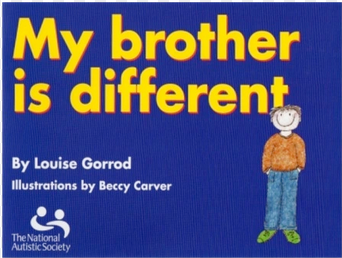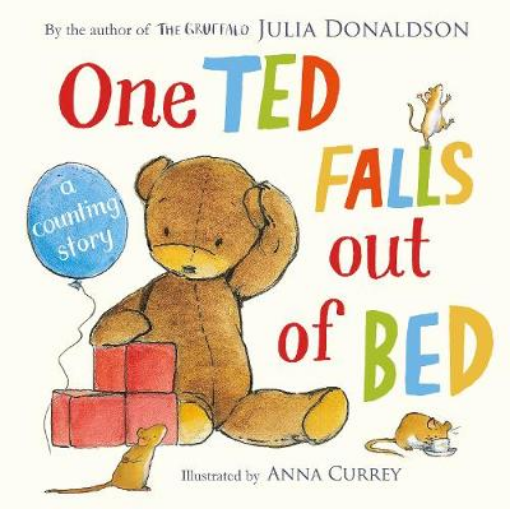For World Autism Awareness Month, I have been asked to share with you our family’s favourite reading books for autistic children. Our son and daughter – now aged 13 and 11 – were diagnosed with autism spectrum disorder (ASD) and attention deficit hyperactivity disorder (ADHD) while at primary school.
Waiting for this type of diagnosis can take a long time, and, once received, you need to decide when it’s best to share this information with your children. When we explained their diagnosis to ours, my son wanted to understand more about autism, so we turned to relevant subject books for help. My brother is Different by Louise Gorrod is particularly useful for helping children understand neurodiversity. This lovely story helped my daughter understand more about her brother and why he would act differently from her. Even though she has the same diagnosis, no two children are the same, and she benefitted from the explanation in this book.

Raising children with special educational needs and disabilities (SEND) is certainly not all about diagnosis and difference. We have read several types of books to ours over the years, and the one they loved when they were very young children, and which we still have, is One Ted Falls Out of Bed by Julia Donaldson, author of The Gruffalo. We read this book to them every evening after their bath, so, as you can imagine, it is very tattered, but it still sits on the bookshelf.

While at primary school, we helped our children read the books they brought home. Our son had a love of all types of books and, once he could choose what he wanted to read, he was more interested in reading about obscure facts, science and the natural environment. At every opportunity, he enjoyed repeating to us the information he had learned. When he was in Year 4, he became interested in fiction and got through the Harry Potter novels like a whirlwind in just 14 days!
Our daughter struggled to read by herself, as she got easily distracted. We helped her start reading independently by reading a page to her and asking her to read the odd paragraph. Over time, she gradually gained more confidence in reading. She still finds it difficult to concentrate on longer books, but she likes short stories, or books with pictures in them, as she needs a visual reference to understand the story.
Choosing reading books for autistic children
Books are very important to all children as they help them to explore the world around them. It’s a misnomer that all autistic children have no imagination. Even though our daughter doesn’t read an awful lot, she enjoys the process of storytelling and has written some short stories that were shortlisted in writing competitions when she was in Years 3 and 5.
Perhaps my early reading struggles gave me the insight to encourage my children with their appreciation of books. As a child growing up in the 1970s and living in a small village, I didn’t have a library nearby. I relied on a library van that came round once a month from which to choose books. There was only a minimal selection, and I found it hard to find one I wanted to read. I would choose a book based on what the cover looked like, but I struggled to sit down and read them.
That changed when I stumbled upon the Nancy Drew novels by Carolyn Keene. I found it easy to imagine that I was Nancy solving the mysteries. From the way these are written, the reader can start to make predictions about how the story will unravel. I have been hooked on crime and mystery books ever since. I would read a book in two days travelling up to London on the train for work, as it is a great way to get stuck into a book. Since having the children, I don’t always have time to read as much as I used to, but I always have a book on the go and still enjoy crime fiction.
My own experience has taught me that there are books out there to suit every child. It might take some children longer than others to find something that interests them, but they will find it with encouragement. Teachers are essential for inspiring a love of reading, and many autistic children will respond so long as they are not pressured into reading a certain type of book. For some, it will be non-fiction and facts; for others, fiction or fantasy.
Autistic children thrive when parents and teachers communicate
To strengthen my relationship with my children’s learning, I became a parent governor at their primary school. This role gave me an insight into what schools need to consider when providing education services for autistic children and SEND pupils generally. Although I wasn’t a SEN link governor (my children being pupils there created a potential conflict of interest), I received training in SEND provision and provided my opinion on school policies as an informed parent.
Having effective SEND policies for schools is, without question, necessary, but open communication, where the teachers actively listen to the parents of SEND children, is just as vital. More often than not, parents will have already tried many approaches to help their child adjust to school. Having teachers who are receptive to adapting parents’ successful methods from home to school can make a great difference to how well autistic children settle in.
Conversely, there are also times when the school – not the parent – identifies that a child has neurodiverse requirements. And there are occasions when a parent cannot respond to the school’s information about their child’s educational needs. In all scenarios, the school’s support is essential.
Overall, our children’s experience at the primary level was positive. The school had an open-door policy and addressed any concerns we had about their progress without delay. Autistic children often require emotional support in the classroom as they can have difficulty interpreting how to behave within a learning environment. Their perceptions of what is happening during lessons can interfere with their ability to learn. Teaching assistants are invaluable for identifying potential stressful situations, implementing effective interventions and providing children with one-to-one support.

The transition from primary education to a secondary level environment can be immensely stressful for autistic children. Where lessons had once taken place in the same room, with the same classmates and teacher, pupils now move between classrooms, learn with children from other forms and are taught by specialist subject teachers. Children with ADHD may struggle with the organisation skills needed to remember to bring in their sports kit, musical instruments and the rest of school paraphernalia on a required day.
Social subjects, including team sports and drama, which make up a significant part of the secondary curriculum, can be a major challenge. While our son thrives on the self-expression offered in drama, he struggles to understand the dynamics needed for team sports and for developing relationships generally. Our daughter prefers to express herself in art and story writing and has had a close relationship with the same best friend for years.
At the end of the holidays, just before starting in Year 7, a transition week might ease the stress associated with changing schools. With a bit of imagination, a time often feared by neurodiverse children (as well as many others) could be fun. A treasure hunt around the school so they get to know the location of the classrooms, the dining hall and other key locations, plus some enjoyable team-building resilience games could make all the difference.
Once again, parents might have the answer. They can certainly recommend some interventions and strategies from primary school; they might work again, or they might not. The main thing to keep in mind when choosing reading books for autistic children and those with ADHD is that are all different!
Thank you for visiting our blog. Our vision here at Books2All is a world where every child finds the books that help them reach their true potential. If you have spare books in good condition at home that you think might be appropriate for school children, please sign up for our app’s pre-release waiting list. If you represent a school, please register to receive books for your students.
Bottom inset image courtesy of vectorjuice – www.freepik.com


Excellent blog, very informative.
Thank you, Sue! We are glad you enjoyed it.